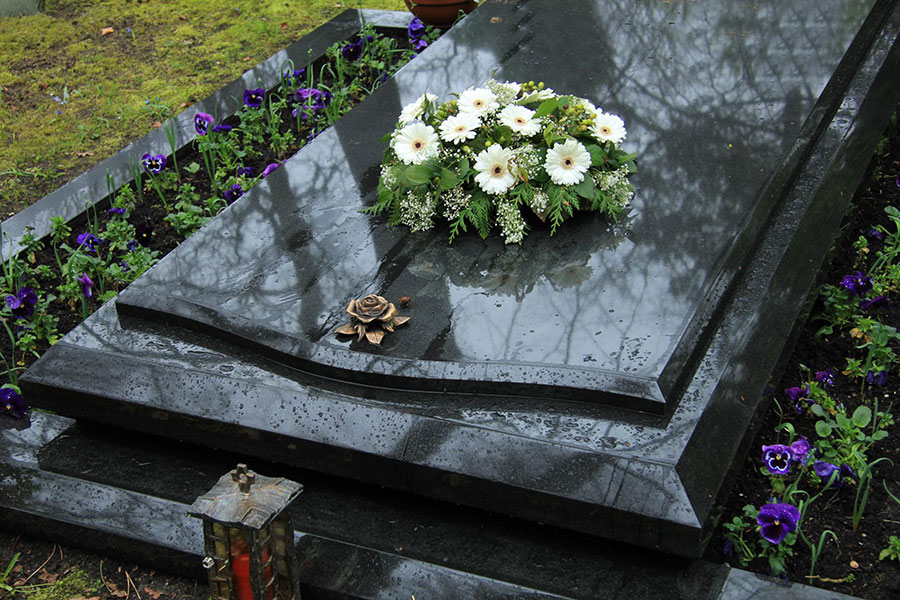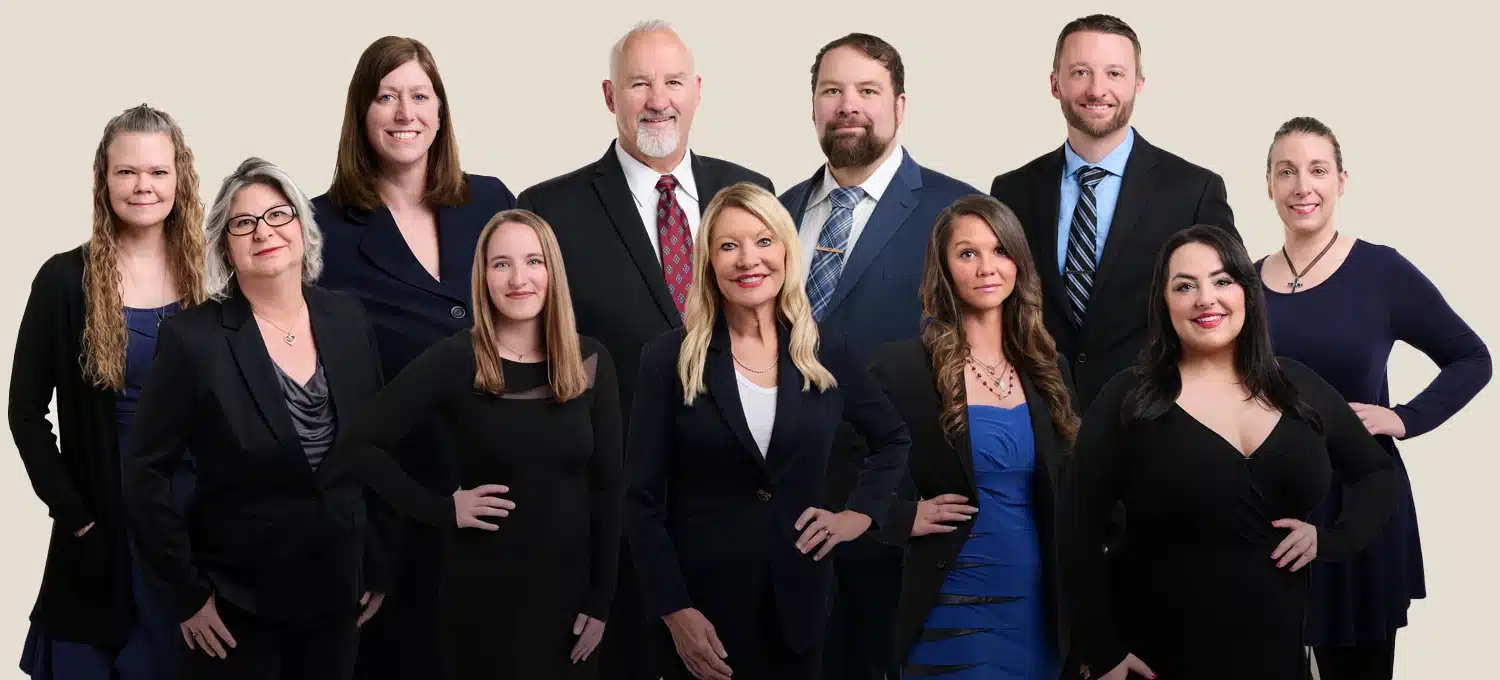Are you grieving after the sudden death of a loved one?
Our law firm has helped guide Montana families through difficult losses for over 75 years.
The sudden accidental death of a spouse or family member is devastating in many ways—emotionally, physically, and financially. If you’ve recently experienced such a loss, we extend our sincerest condolences. We understand that this is a very dark and sad part of your life, and what you’re going through is unimaginable.
No amount of money can ever make up for your loss. But unfortunately, life doesn’t wait for grief-stricken survivors to process their loss before medical expenses, funeral costs and other bills come knocking at their door.
Assisting Montana families by filing wrongful death claims to pay for immediate expenses and secure their financial future is how we’re able to do our part to help during this difficult time.
A wrongful death lawyer with Murphy Law Firm in Great Falls, MT, can help you seek justice and compensation if third-party negligence resulted in a family death or the loss of a loved one. Although we know that the pain of losing someone you love can never be completely resolved, we’re here to assist you in seeking full and fair compensation to help you cope with your loss and secure your family’s financial future.
Why hire Murphy Law Firm?
- We put our clients first
- We ONLY represent the injured
- Compassionate, aggressive and personal legal representation
- Licensed attorneys with extensive legal knowledge
- 75+ years of combined experience
- We’ve recovered millions of dollars in settlements for our clients
- Contingency fee (you don’t pay unless we win)
- Free consultation
Attorney Thomas J. Murphy
Founder of Murphy Law Firm
If a loved one has been a victim of wrongful death in the workplace or otherwise, our skilled team can build a compelling case in order to help you and your family receive compensation for your monetary and emotional losses.
Case results
Murphy Law Firm has successfully represented thousands of Montanans, including complex workers’ compensation claims.
Common Types of Wrongful Death Claims in Montana
Murphy Law Firm has represented hundreds of spouses and families of deceased accident victims who have suffered fatal injuries in Montana. Wrongful death can happen in many different situations, such as:
Deadly crashes involving trucks, motorcycles, cars and airplanes can happen anywhere, but they’re especially common on the winding, rural roads and highways throughout our state. In fact, Montana is one of the worst states in the country for fatal motor vehicle accidents, with more than double the crash fatality rate of other states. Car accident lawsuits are much more serious and complex when there’s a death, which is why hiring an experienced car accident attorney is so important.
Montana recently ranked third in the nation for number of deaths on the job, according to the federal Bureau of Labor Statistics. For every 100,000 workers in Montana, 7.9 died as a result of injuries sustained at work. Montana’s workers’ compensation law generally forces companies to pay a deceased worker’s family for medical expenses and other financial damages. However, if a surviving spouse or relative wishes to pursue compensation for pain and suffering or other damages, they may need to pursue a personal injury lawsuit.
Wrongful death claims are common in a wide number of personal injury cases.
These “tort” cases can involve medical malpractice (by a physician, surgeon, dentist, or hospital), product liability (from negligent designers, manufacturers, or sellers), or hazardous conditions and toxic substances (in the workplace, home or community).
Montana Wrongful Death Law
What is Wrongful Death?
A wrongful death can happen under virtually any circumstances but is typically defined as a fatal personal injury that was caused by the negligence or reckless actions of another person.
Individuals guilty of distracted driving and other negligent behaviors can be held liable (both in criminal and civil court) for the wrongful death of another person.
A wrongful death claim is a civil lawsuit where a personal representative seeks compensation for damages on behalf of the deceased’s behalf, since they are no longer able to do so themselves. This differs from a criminal case, in which charges are filed by the federal, state or local government.
According to Montana statutes (27-1-513. Action for wrongful death):
When injuries to and the death of one person are caused by the wrongful act or neglect of another, the personal representative of the decedent’s estate may maintain an action for damages against the person causing the death or, if the person is employed by another person who is responsible for the causing person’s conduct, then also against the other responsible person.
In contrast to a criminal case where a defendant is sentenced with jail time, fines or other penalties, in a wrongful death claim, monetary damages are paid by the defendant if they are found to be liable for the decedent’s death.
What are the elements of negligence in Montana?
To establish negligence in a wrongful death case, the plaintiff (usually a representative of the deceased’s estate or close family members) must prove 4 essential elements:
- Duty of care. The plaintiff must demonstrate that the defendant owed a duty of care to the deceased. This means showing that the defendant had an obligation to act in a certain way toward the deceased, such as driving safely to avoid harming others on the road.
- Breach of duty. Once a duty of care is established, the plaintiff must prove that the defendant breached this duty through action or inaction. For instance, if a driver was speeding or a property owner failed to address a known hazard, these scenarios could constitute breaches of duty.
- Causation. It must be shown that the defendant’s breach of duty directly caused the death of the deceased. This involves proving that the death would not have occurred but for the defendant’s negligence. Causation can often be the most challenging element to prove, as it requires linking the breach of duty directly to the fatal outcome.
- Damages. Lastly, the plaintiff must prove that the death of the deceased resulted in quantifiable damages. This can include medical expenses incurred before death, funeral and burial costs, loss of the deceased’s expected earnings, loss of benefits (such as insurance), and non-economic damages such as pain and suffering endured by the deceased prior to death or loss of companionship for the surviving family members.
Successfully proving these 4 elements in a Montana wrongful death case can lead to a judgment in favor of the plaintiff, allowing for the recovery of damages from the defendant.
What is the comparative negligence law in Montana, and how can it impact compensation in a wrongful death case?
Montana’s comparative negligence law is a legal doctrine that apportions fault among all parties involved in an incident that causes injury or death. It allows for damages to be reduced in proportion to the percentage of fault assigned to the plaintiff (or, in wrongful death cases, the deceased or their estate).
This means that if the deceased was partially at fault for the incident that led to their death, the total amount of compensation that can be recovered by the estate or surviving family members can be reduced accordingly.
Here’s how comparative negligence might impact compensation in a wrongful death case in Montana:
- Determining fault. During the lawsuit, both the defendant’s and the deceased’s actions leading up to the incident will be examined to determine what percentage of fault belongs to each party. This involves a thorough investigation and presentation of evidence.
- Calculating damages. Once fault is apportioned, the total damages awarded will be adjusted based on the deceased’s percentage of fault. For example, if a court awards $1,000,000 in damages but finds that the deceased was 30% at fault for the incident, the award would be reduced by 30%, or $300,000, resulting in a net award of $700,000.
It’s important to note that Montana follows a modified comparative negligence rule with a 51% bar. This means that if the deceased is found to be 51% or more at fault for their own death, the estate or family members would be barred from recovering any compensation under the wrongful death claim.
Given the potential for significant reductions in recoverable damages, individuals pursuing a wrongful death claim in Montana should consider consulting with an experienced wrongful death attorney who can navigate the complexities of comparative negligence to seek the fairest possible outcome.
Eligibility for Wrongful Death Compensation
Montana law says that only a “personal representative” of the deceased person can seek a wrongful death action. This is usually a family member, such as a spouse, child, sibling or parent. However, it doesn’t necessarily have to be any of these individuals.
So, who may file a wrongful death lawsuit in Montana?
The answer depends on the circumstances of each case, but generally speaking, only those who were closest to the deceased may seek damages for the loss they’ve experienced. In most cases, only people related to the deceased individual in the following ways are allowed to file a wrongful death claim in Montana:
- Spouse
- Parents or legal guardian
(if the person who died was under the age of 18) - Child/children
- Sibling
- Person designated as representative of the estate
(as noted in a living will)
In rare cases, the parents of an adult deceased child may also be eligible to receive wrongful death benefits under certain circumstances, such as if they’re the adult child’s caretaker.
By limiting who can file a wrongful death lawsuit, Montana lawmakers aim to prevent others from exploiting the tragic death of a person for personal financial gain.
Wrongful Death Statute of Limitations
Each state has their own statute that determines how long an eligible person has to file a wrongful death lawsuit after the loss of their loved one due to negligence. In Montana, you must file a wrongful death lawsuit within 3 years of the death of your loved one.
Generally, the clock typically starts ticking from the date of the deceased person’s death. Wrongful death claims that aren’t filed before the end of this three-year period are usually dismissed by the court without a hearing.
Note: One exception to this time limit is if the wrongful death case is linked to a criminal homicide. In these cases, the statute of limitations for filing a civil claim is extended to 10 years.
How are wrongful death settlements calculated?
Economic Damages
Economic damages in a wrongful death suit include any tangible costs associated with the death, such as:
- Loss of prospect of inheritance
- Medical costs resulting from fatal injury
- Funeral and burial expenses
- Loss of the deceased person’s income
- Loss of benefits the deceased person would likely have earned during their expected lifetime
The extent of economic damages in a wrongful death case is determined by the jury based on the age of the deceased person, their health conditions, earning capacity, and life expectancy.
The amount decided upon by the jury is subject to adjustments by the court, which is why it’s imperative that you contact a wrongful death attorney who can illustrate the true extent of your losses. We can help you compile evidence and expert witnesses to pursue your full damages.
Non-Economic Damages
In addition to economic damages that can be awarded in a wrongful death settlement, you may also be eligible to receive non-economic damages, such as:
- Loss of care provided by deceased person
- Loss of support or services that the deceased person provided
- Pain, suffering and emotional distress
- Loss of companionship and consortium
These intangible damages are dependent on the condition and incidents leading to the victim’s death, including the severity of their pain.
Non-economic compensation will benefit the estate of the deceased person. A wrongful death attorney can help you quantify non-economic pain and suffering to compensate you for emotional losses in addition to your monetary losses.
Is there a limitation on wrongful death awards?
Montana wrongful death jury awards are subject to the same statutory limitations applicable to other personal injury claims. That is, jury awards must be “no more than reasonable.”
Some of the limitations are as follows:
- A wrongful death action can be brought for medical malpractice. However, a medical malpractice award for noneconomic loss may not exceed $250,000. MCA §25-9-411
- Montana statutes also limit punitive damages to “$10 million or 3% of a defendant’s net worth, whichever is less.” MCA §27-1-220
- A Montana governmental agency can be sued for wrongful death. However, damages cannot exceed $750,000 for each claim and $1.5 million for each occurrence. MCA §2-9-108
How to file a wrongful death claim in Montana
If you’re considering a wrongful death claim in Montana, you’ll need to take the following steps, ensuring that you file your claim before the statute of limitations expires:
- Determine the executor of the estate. As we mentioned above, only the personal representative of the deceased’s estate, also known as the “executor,” can file a wrongful death claim in Montana. This individual is typically named in the deceased’s will or determined by law if there is no will.
- Obtain the death certificate. Next, the personal representative should obtain a death certificate from the Department of Health. This document is essential for filing a wrongful death claim.
- Consult a wrongful death lawyer. After obtaining the death certificate, the deceased’s representative should seek guidance from an experienced Montana lawyer specializing in wrongful death cases. They will investigate the circumstances of the death, identify responsible parties, and gather evidence to prove negligence.
- File a lawsuit. With the assistance of an attorney, the representative should then file a claim by submitting a notice and a complaint to the appropriate court before the statute of limitations expires.
Navigating a wrongful death claim can be complex, but with the help of a skilled attorney, you can successfully pursue justice and compensation for your loss.
Is it hard to win a wrongful death lawsuit?
Winning a wrongful death lawsuit can be challenging due to the complexity of establishing negligence, proving causation, and navigating the legal system.
Plaintiffs must convincingly demonstrate that the defendant’s actions or inactions directly led to the death of their loved one, fulfilling all elements of negligence: duty of care, breach of duty, causation and damages.
Additionally, factors such as comparative negligence can complicate the case further by potentially reducing the compensation if the deceased is found partially at fault.
Given these intricacies, the success of a wrongful death lawsuit often hinges on the quality of the evidence presented and the expertise of the legal representation. Therefore, while not impossible, achieving a favorable outcome in a wrongful death lawsuit requires thorough preparation, detailed evidence gathering, and skilled legal advocacy.
Schedule a FREE Consultation With an Experienced Montana Wrongful Death Attorney
If a jury finds that wrongful death has occurred, a spouse or next of kin may be eligible to receive compensation. Seeking financial restitution can help provide for your future in this time of struggle, as well as hold all responsible parties accountable. We can help you assess every aspect of your loved one’s death to ensure that you are compensated for both monetary and emotional losses.
If your loved one has been the victim of wrongful death, our attorneys can build a compelling case on your behalf in order to help you receive justice and compensation.
Contact Murphy Law Firm today to schedule your free consultation.
“I recommend Murphy Law Firm to anyone who needs legal assistance with a Workers’ Compensation claim. I was beyond impressed with Tommy Murphy’s handling of my case and ecstatic about the outcome. Incredibly professional and knowledgeable. No one in Montana knows more about this area of law.”











